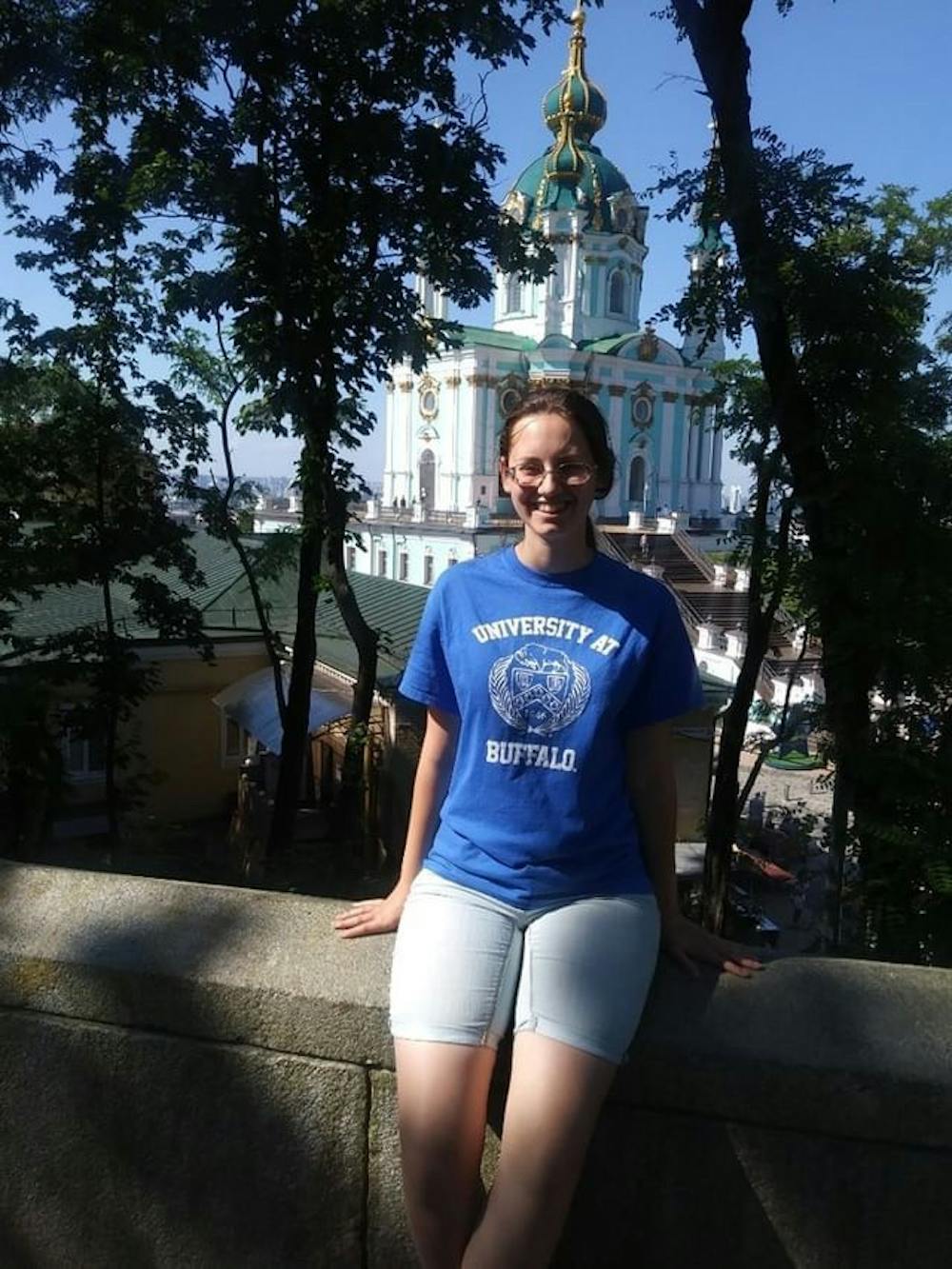Antonina Bandrivska, a graduate student studying biology, has recently become best friends with sleep deprivation. Endless nights and tired days have become an essential part of her being since Feb. 24.
While Bandrivska exhaustededly wakes up to the sounds of her alarm clock each morning, her family continues to wake up in war-torn Ukraine, which has been tormented by the sounds of screaming and explosions for the past two weeks.
Bandrivska immigrated to the U.S. from Ukraine at 16, over six years ago. However, her immediate family — including her dad, siblings, aunts, cousins and nieces — and many of her closest friends still live in Ukraine, which has been at war with Russia since 2014 — but in the midst of a direct confrontation since Feb. 24.
Bandrivska’s life has been poisoned with anxiety and constant concern for the safety of her family, but she says she continues to push through it by attending her classes and spreading awareness of the conflict.
“Sometimes I try not to think about it,” Bandrivska said. “I have to push through and wake up to go to class. And when I think about it, it’s hard. It’s all just very emotional. I somehow have to get up and act like everything is normal. But it’s not. It’s all falling apart. It’s too hard. But I do it anyway. Almost my whole life is there in Ukraine and people are walking around campus like everything we love isn’t at risk.”
Bandrivska talks with her father, who is still living in the Ukranian capital of Kyiv, daily in an effort to ease her anxious mind. But their once normal phone conversations, filled with life updates and laughter, have morphed into once-a-day check-ins, to make sure her dad is still safe.
“I talk to my dad everyday, just to ask the daily, ‘Hey, are you OK?’” Bandrivska said. “Not that anyone could be OK right now, but I ask anyway. My hometown is near some small towns that have just been bombed, so I worry about him a lot. Our talks are usually just about war, war, war, war, war and that can be exhausting — but it’s still important to talk.”
Bandrivska’s concerns for her father don’t stop at bombings and explosions. They also extend to his ability to access the resources he needs to live.
“I’ve heard some things saying that there is a shortage of food in my hometown, people are forced to scavenge to stay alive,” Bandrivska said. “It’s so terrifying.”
While Bandrivska remains in constant contact with her father, some of her other family members living in Eastern Ukraine are not as easy to reach, due to damages to the infrastructure caused by the war.
“Everything depends, geographically, on how my family is doing,” Bandrivska said. “We haven’t heard from my family in Eastern Ukraine because the war has taken out a lot of the internet for a while, so we aren’t always able to get into contact with them.”
On the occasions Bandrivska has heard from her family in the eastern part of the country, they have expressed that their living conditions are dangerous and concerning. Bandrivska’s cousins have talked to her about seeking asylum in basements and not coming out for days at a time.
“Some of my family has had to go into neighbors’ basements and these aren’t what Americans think of when they hear the word ‘basement,’” Bandrivska said. “It isn’t the same. In Ukraine, the basement is some dark room where you keep your potatoes, they normally have lots of mold and aren’t finished or comfortable. My cousin is staying in one right now and she worries about how she might get sick because her breathing isn’t the best. She just stays down there with a flashlight. A lot of the televisions don’t work, and she waits for it all to be over. It’s just quite scary.”
Bandrivska’s family continues to prepare for the worst.
“My family has been learning to make [molotov] cocktails” — glass bottles filled with flammable liquids that can melt or set tanks on fire — “and training just in case, God forbid, something does happen and they need to fight to defend themselves,” Bandrivska said.
But Bandrivska is over 4,000 miles away from her home country, which means she can best help by spreading awareness and telling her story.
“I want people to know about my family and not just our strength, but also Ukraine’s strength,” Bandrivska said. “We need students to go out and sign petitions, write letters to politicians, or help ship supplies. Please, I feel helpless from this far away too, but there are things we need to do. Today it is Ukraine and my family, but tomorrow it could be yours.”
Bandrivska continues to advocate for a peaceful end to the war, so that her family can wake up to the sounds of an alarm clock rather than the sounds of screaming.
“We need to pray for everyone, including our enemies and just hope for peace,” Bandrivska said.
Kayla Estrada is an assistant news/features editor and can be reached at kayla.estrada@ubspectrum.com

Kayla Estrada is the opinion editor at The Spectrum. She is an English major who enjoys rainy weather, “Bob’s Burgers” and asking people who they voted for. When she’s not writing, she can be found hunting for odd-looking knick-knacks at the nearest thrift store.





